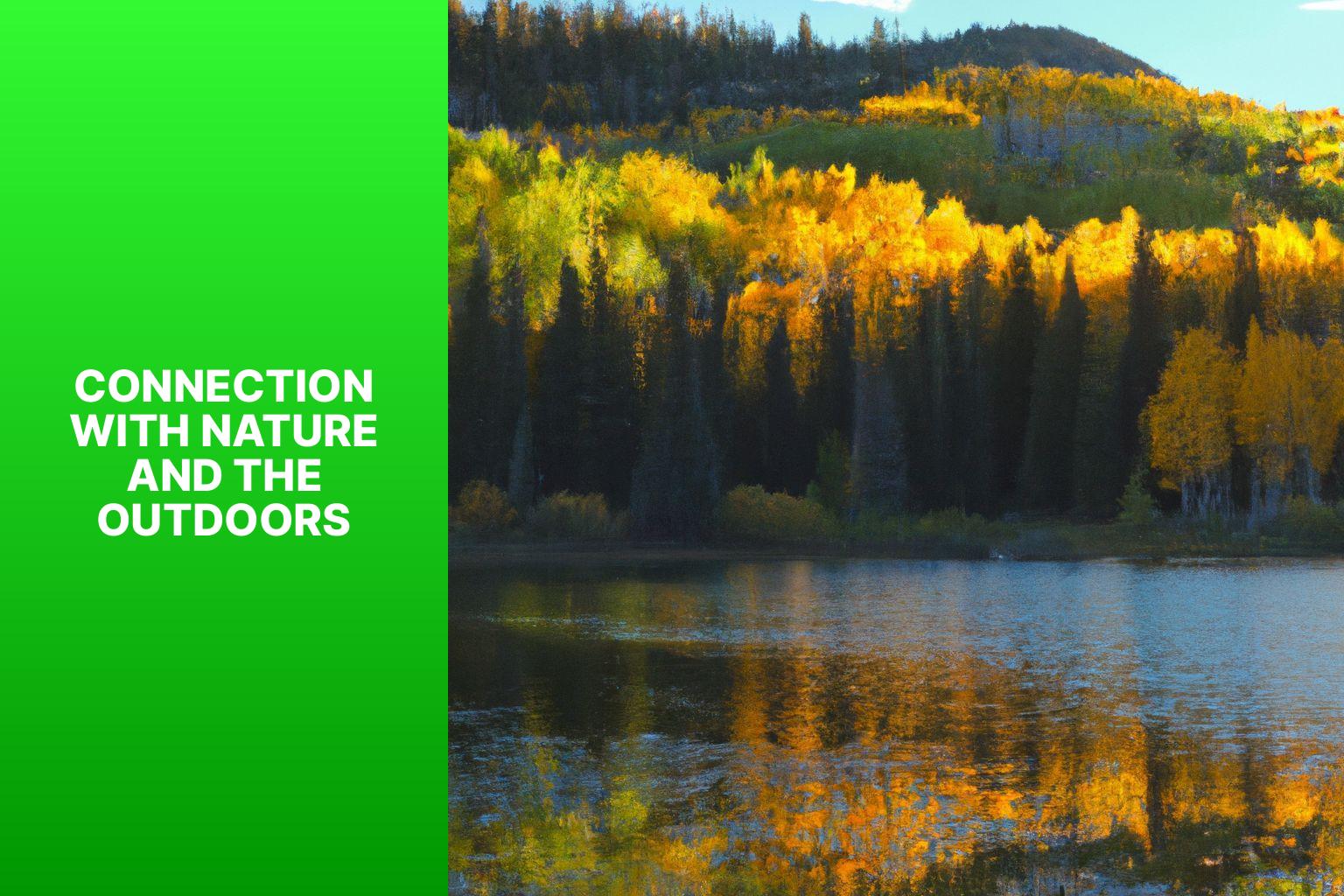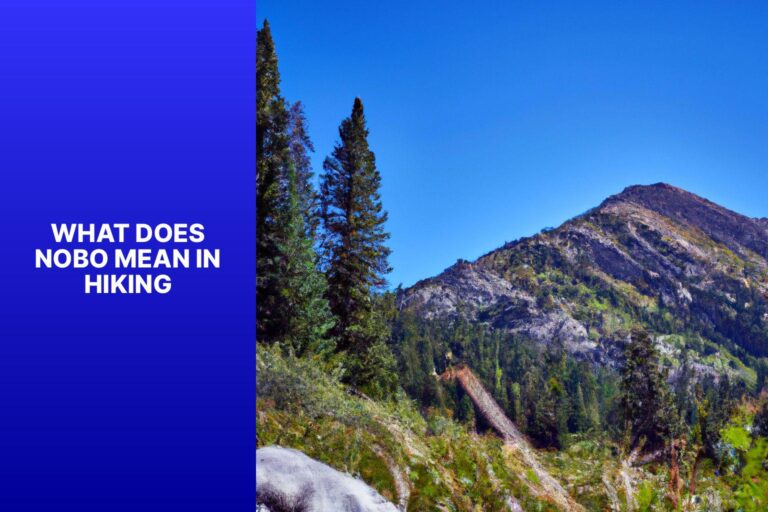Why Do I Hike
Hiking is much more than just a leisure activity it offers a multitude of physical, mental, and social benefits that make it a truly rewarding experience. Whether you’re a seasoned hiker or a beginner, the reasons to hit the trails are endless. Let’s explore the various reasons why hiking is a popular and fulfilling activity for many outdoor enthusiasts.
One of the major benefits of hiking is its positive impact on physical health. When you embark on a hiking journey, you engage in a full-body workout that comes with a range of advantages. Some of these benefits include improved cardiovascular health, increased endurance and stamina, weight loss and maintenance, and stronger muscles and bones. Hiking provides an excellent opportunity to elevate your heart rate, strengthen your muscles, and support overall physical fitness. For more information on what muscles hiking works, you can visit this link.
Not only does hiking benefit the body, but it also promotes mental well-being. Spending time in nature and outdoor settings can have a profound impact on reducing stress and anxiety levels. The calming effect of nature, coupled with physical activity, helps release endorphins, also known as “feel-good” chemicals, resulting in improved mood and mental well-being. hiking has been found to enhance cognitive function, including improved memory, creativity, and focus.
Hiking allows you to connect with nature and enjoy the beauty of the outdoors. It provides an escape from the busy urban environment, allowing you to immerse yourself in natural landscapes, discover breathtaking scenery, and get up close with wildlife. Hiking offers the chance to challenge yourself, overcome obstacles, and push your personal limits. By conquering treacherous terrains or completing challenging trails, you can experience a sense of accomplishment and personal growth.
In addition to the physical and mental benefits, hiking offers a unique opportunity to build camaraderie and forge social connections. Whether you hike with friends, join group hikes, or participate in organized events, this activity creates a shared experience that fosters bonds and deepens relationships. Hiking with others allows for shared moments of triumph, encourages teamwork, and provides a platform for meaningful conversations and connections.
With all these compelling reasons, it’s no wonder why hiking is a beloved activity for many. Whether you’re seeking physical fitness, mental rejuvenation, a connection with nature, or a chance to build social bonds, hiking offers a wide array of benefits that make it a truly worthwhile pursuit. Lace up your hiking boots, grab your gear, and embark on an adventure that will nourish both body and soul.
Key takeaway:
- Hiking improves physical health: Regular hiking can lead to improved cardiovascular health, increased endurance and stamina, weight loss and maintenance, as well as stronger muscles and bones.
- Hiking enhances mental well-being: Engaging in hiking can reduce stress and anxiety, improve mood and mental well-being, and enhance cognitive function.
- Hiking allows for connection with nature: By hiking, individuals can experience the beauty of nature, get close to wildlife, and overcome challenges, thus building a stronger connection with the outdoors.
Physical Health Benefits of Hiking
Hiking isn’t just about exploring breathtaking landscapes and connecting with nature. Dive into the physical health benefits that hiking has to offer. Discover how it improves cardiovascular health, boosts endurance and stamina, aids in weight loss and maintenance, and strengthens muscles and bones. Strap on your hiking boots and embark on a journey towards a healthier, fitter self. Get ready to unleash the power of hiking on your physical well-being.
Improved Cardiovascular Health
Hiking improves cardiovascular health by increasing heart rate, improving blood circulation, lowering blood pressure, reducing the risk of heart disease, and enhancing lung capacity.
Increased heart rate: Hiking uphill makes your heart work harder, which strengthens the heart muscle.
Improved blood circulation: Regular hiking expands blood vessels, improving blood flow and oxygen delivery.
Lower blood pressure: Hiking helps lower blood pressure, reducing the risk of heart attacks and strokes.
Reduced risk of heart disease: Regular hiking lowers cholesterol levels, maintains a healthy weight, and improves overall cardiovascular fitness.
Enhanced lung capacity: Deep breathing during hiking improves lung capacity, allowing for better oxygen intake.
To further improve cardiovascular health through hiking, consider these suggestions:
- Start slowly and gradually increase intensity and duration.
- Choose trails with varied terrains.
- Incorporate interval training by alternating between intense hiking and slower-paced walking.
- Stay hydrated during hikes.
- Invest in good hiking shoes for stability and comfort.
Incorporating hiking into your routine offers the many benefits of improved cardiovascular health while enjoying nature.
Increased Endurance and Stamina
Hiking is a fantastic way to increase endurance and stamina. It not only improves cardiovascular health, lung capacity, and muscular strength, but also enhances mental stamina. Incorporating uphill walks and backpack-carrying during hikes intensifies the workout and boosts endurance. Hiking for longer periods of time helps develop stamina and has a positive impact on other physical activities and sports. Gradually increasing the duration and intensity of hikes over time is key to building endurance. Hiking on various terrains effectively targets different muscle groups and contributes to overall stamina improvement. By challenging yourself with more demanding and longer hikes, you can experience significant increases in endurance and stamina. Ultimately, the improved endurance and stamina gained from hiking enhance overall fitness, making daily activities feel much easier.
Weight Loss and Maintenance
Hiking is an excellent activity for weight loss and maintenance. Here are some facts to consider:
1. Hiking is active and promotes weight loss and maintenance. A person weighing 180 pounds can burn about 440-550 calories per hour depending on factors like speed and terrain.
2. Hiking boosts your metabolism, aiding in weight loss and maintenance even after you finish hiking. This means you’ll continue burning calories at a higher rate throughout the day.
3. Hiking engages various muscle groups, contributing to increased fat burning and improved body composition. Uphill hikes work your leg muscles, including quads, calves, and glutes, while different terrains engage your core muscles.
4. Hiking is a low-impact activity that puts less stress on joints compared to running or high-intensity workouts, making it ideal for weight loss and maintenance. It’s particularly beneficial for individuals with joint issues or those who prefer gentle activity.
Why is Hiking Such a Complete Lower Body Workout
5. Hiking offers the opportunity to explore new trails and surroundings, making it a fun and enjoyable way to stay active and motivated while working towards weight loss and maintenance. The variation in terrain and scenery keeps your workouts interesting and prevents boredom.
Remember, weight loss and maintenance require regular exercise and a healthy diet. While hiking can contribute to weight loss and maintenance, it’s important to complement it with a balanced and nutritious eating plan. Consult with a healthcare professional or a certified nutritionist for personalized advice on effectively managing your weight.
Stronger Muscles and Bones
Hiking is a fantastic way to naturally incorporate stronger muscles and bones while exploring nature and enjoying the outdoors. It not only provides health benefits, but also helps in promoting the development of robust muscles throughout the body, including the legs, core, and upper body. By engaging different muscle groups through uphill climbs and varied terrain, hiking enhances both strength and endurance. Hiking on uneven surfaces also contributes to improved balance and stability, ultimately contributing to overall muscle strength.
In terms of bone health, hiking is classified as a weight-bearing exercise, which is highly advantageous. The impact caused by walking and climbing stimulates the bones, resulting in increased density and strength. This is particularly beneficial for individuals at risk of osteoporosis or for those who aim to maintain healthy bones.
To further enhance muscle and bone strength during hiking, it is recommended to carry a backpack with some weight. The added load challenges the muscles and aids in further strength development.
In order to maximize the benefits of hiking for stronger muscles and bones, it is crucial to gradually increase the difficulty and duration of your hikes. This progressive approach allows your body to adapt and grow stronger over time.
So, put on your hiking boots and hit the trails to enjoy the rewards, including the development of stronger muscles and bones. Your body will thank you!
Mental Health Benefits of Hiking
Did you know that hiking can do wonders for your mental health? In this section, we’ll explore the incredible benefits that hiking can have on your mind and well-being. From reducing stress and anxiety to boosting your mood and cognitive function, hiking is a powerful tool for improving your mental wellness. So lace up your boots and let’s dive into the transformative effects of hitting the trails!
Reduced Stress and Anxiety
Reduced stress and anxiety are benefits of hiking, improving mental well-being and overall health. Engaging in physical activity outdoors effectively diminishes stress levels and alleviates symptoms of anxiety. Recent studies have demonstrated that regular hiking not only decreases levels of cortisol, the stress hormone, but also enhances the production of endorphins, which are the “feel-good” chemicals in the brain.
By immersing oneself in nature and being fully present in the moment, hiking creates a sense of calmness and tranquility. The serene surroundings, fresh air, and soothing sounds contribute to promoting relaxation. As one moves and engages their muscles, tension is released, fostering a state of mind that is relaxed and at ease.
In addition, hiking provides individuals with the opportunity to disconnect from the daily pressures of life and find solitude for reflection. It serves as a break from technology and screens, allowing the mind to recharge and rejuvenate. The rhythm and physical exertion of hiking aid in clearing the mind and improving mental focus.
It is important to note, however, that while hiking can be beneficial in reducing stress and anxiety, it should not be regarded as a substitute for professional medical advice or treatment. Those experiencing severe or chronic stress or anxiety should consult with a healthcare professional. Integrating hiking into a well-balanced lifestyle can enhance overall well-being and effectively manage stress in a natural way.
Improved Mood and Mental Well-being
Hiking is a wonderful activity that can greatly enhance one’s physical health and have a significant positive impact on their mood and overall mental well-being. Engaging in regular hiking activities has been proven to improve mood and contribute to a sense of overall mental well-being.
When hiking outdoors in nature, individuals experience a boost in mood and emotional well-being. The combination of fresh air, breathtaking scenic views, and serene surroundings can enhance positive feelings while simultaneously reducing stress and anxiety. Extensive research has shown that spending time in nature promotes relaxation and effectively alleviates symptoms of depression.
Hiking provides individuals with an opportunity to practice mindfulness and connect with the present moment. By distancing themselves from the distractions and pressures of daily life, hikers can experience a profound sense of calm and mental clarity. This further enhances their overall mental well-being and fosters the development of a positive mindset.
Hiking serves as a platform for individuals to challenge themselves physically and mentally. Conquering various hiking trails and overcoming obstacles along the way can lead to a great sense of accomplishment, heightened self-confidence, and a more optimistic outlook on life.
Hiking is a social activity that allows individuals to connect with others and form strong bonds. Whether it’s sharing the hiking experience with friends or joining hiking groups, engaging in this activity contributes to the development of a positive social support system.
Enhanced Cognitive Function
When hiking, there are several cognitive benefits. Here are some ways hiking can enhance cognitive abilities:
1. Improved memory: Hiking stimulates the brain and enhances memory function. It promotes new brain cell growth in the hippocampus, responsible for memory formation and retention.
2. Enhanced creativity: Spending time in nature while hiking can enhance creative thinking. It allows the mind to wander and promotes innovative ideas and problem-solving skills.
3. Increased focus and attention: Hiking in natural environments improves focus and attention span. It provides a break from modern life’s constant stimuli and distractions, allowing the brain to reset.
4. Reduced mental fatigue: Hiking provides a mental break from daily demands, reducing mental fatigue and improving cognitive performance. Nature has a restorative effect on the brain, leaving you refreshed and ready to tackle tasks with clarity.
5. Enhanced problem-solving skills: Navigating unfamiliar terrain and overcoming obstacles during hiking can sharpen problem-solving abilities and cultivate adaptability.
6. Improved mental well-being: Hiking reduces stress, anxiety, and symptoms of depression. Positive mental health enhances cognitive function.
Remember, regular physical activity, like hiking, is crucial for experiencing these cognitive benefits. So, lace up your hiking boots and hit the trails to enhance cognitive function while enjoying nature’s beauty.
Connection with Nature and the Outdoors

Photo Credits: Jasonexplorer.Com by Gerald Torres
Hiking allows individuals to connect with nature and the outdoors. It fosters a deeper connection with nature by engaging hikers with their surroundings and creating a sense of awe and wonder through the sights, sounds, and smells encountered during the hike. Hiking also provides an opportunity to disconnect from the fast-paced modern world and fully embrace the tranquility of nature. This break from daily routines can alleviate stress and improve mental well-being.
Hiking promotes an active lifestyle and enhances physical fitness. The challenging terrains encountered during hikes engage various muscle groups, promoting strength and endurance. This physical activity releases endorphins, which boost mood and well-being.
Exploring New Places and Experiencing Adventure
Venturing into uncharted territory, we wander through nature’s untamed wonders, seeking to quench our thirst for adventure. This section unravels the exhilarating essence of exploring new places, where endless possibilities loom on the horizon. Our journey begins by delving into the art of discovering beautiful scenery, immersing ourselves in breathtaking vistas that stir the soul. We then tread along the path of getting close to wildlife, encountering magnificent creatures that remind us of our place in the intricate tapestry of life. We shall conquer challenges, defy our limits, and embark on a personal voyage of growth and self-discovery.
Discovering Beautiful Scenery
Hiking offers the chance to immerse in nature and discover beautiful scenery. The landscapes found while hiking are truly awe-inspiring, including majestic mountain peaks, serene forests, and tranquil lakes. The variety of landscapes and environments explored while hiking is vast, from rugged terrains to lush meadows. Witness the wonders of nature firsthand, from vibrant wildflowers blooming in spring to the colorful foliage of autumn.
Discovering beautiful scenery while hiking goes beyond visual appeal. It provides a chance to connect with the natural world on a deeper level. Surrounded by untouched landscapes, it brings serenity and tranquility, providing an escape from daily life’s stresses and solace in nature’s beauty.
Nature uplifts the spirit and rejuvenates the soul. Discovering beautiful scenery while hiking invites appreciation for the wonders around us and cultivates a sense of gratitude for the natural wonders that exist.
Getting Close to Wildlife
Getting close to wildlife while hiking offers an enriching experience. Interacting with animals in their natural habitat creates a lasting connection with nature. Here are some reasons why getting close to wildlife is significant while hiking:
1. Appreciating biodiversity: Observing different animal species in their natural environment allows us to appreciate the incredible diversity of life on Earth. It is awe-inspiring to witness the beauty and intricacies of various wildlife species.
2. Learning opportunities: Getting close to wildlife provides an educational experience. You can learn about animal behaviors, habitats, and ecosystems. This knowledge deepens your understanding of the natural world and fosters a sense of environmental stewardship.
3. Wildlife conservation: By observing and appreciating wildlife, we develop a responsibility toward protecting and conserving their habitats. This awareness inspires actions that contribute to conservation efforts.
4. Thrilling encounters: Coming face-to-face with wildlife adds an element of adventure to your hiking experience, creating unforgettable memories.
5. Connecting with nature: Animals captivate our attention and create a sense of tranquility. Being in the presence of wildlife helps us connect with nature on a deeper level, promoting relaxation and well-being.
To ensure a positive wildlife viewing experience, remember to maintain a respectful distance, avoid disturbing or feeding the animals, and follow any regulations or guidelines provided by park authorities. The goal is to appreciate wildlife while minimizing our impact on their behavior and habitat.
Overcoming Challenges and Pushing Personal Limits
When it comes to hiking, one of the most rewarding aspects is overcoming challenges and pushing personal limits.
Hiking allows individuals to test their physical and mental strength while conquering difficult terrain and obstacles. Why does hiking burn so many calories?
This builds resilience, determination, and provides a sense of accomplishment and personal growth.
Building Camaraderie and Social Connections
Building camaraderie and social connections is crucial when it comes to hiking. It provides an opportunity to bond with others, create lasting friendships, and foster a sense of community.
Hiking brings people together through challenging trails and outdoor adventures, which helps in bonding with others and nurturing camaraderie. It allows individuals to meet like-minded people who share a passion for the outdoors, leading to meaningful and enduring friendships. Hiking communities also play a significant role in fostering a sense of community, offering a supportive and inclusive environment for individuals to connect and learn from each other.
Hiking with a diverse group exposes hikers to different perspectives and cultures, broadening horizons and promoting understanding and acceptance. This exploration of different viewpoints adds to the overall experience and contributes to building camaraderie.
Hiking enhances overall well-being by reducing stress and improving mood, which is beneficial for building stronger social connections. By prioritizing hiking, individuals not only conquer trails but also build meaningful connections with others who share a love for nature and adventure.
Frequently Asked Questions
1. What is the documentary “Why Do I Hike?” about?
The documentary “Why Do I Hike?” follows Croatian filmmaker Nikola Horvat as he hikes the Colorado Trail and explores the reasons behind his passion for hiking.
2. What are some of the themes explored in the documentary?
The film is divided into five chapters, each answering the question of why people hike. These chapters explore nature, time, community, mental health, and Horvat’s personal thoughts and desires.
3. Who is Nikola Horvat and what is his experience with long-distance hiking?
Nikola Horvat is an experienced thru-hiker who has completed long-distance trails such as the Pacific Crest Trail and has established the Croatian Long Distance Trail.
4. What is the significance of the hiking community in the film?
The film highlights the supportive and respectful community that hikers form in the wilderness. Other hikers featured in the film share similar sentiments and reasons for hiking.
5. What are some of the benefits of hiking mentioned in the film and article?
Hiking is considered therapeutic for mental health, provides opportunities for relaxation, improves cognitive ability, boosts self-esteem and mood, and offers physical benefits such as burning calories and improving balance and strength.
6. What is the significance of the landscapes showcased in the documentary?
The film showcases beautiful landscapes of the Colorado Rockies and is accompanied by music, providing an additional reason for viewers to explore the outdoors and experience the awe-inspiring footage.







